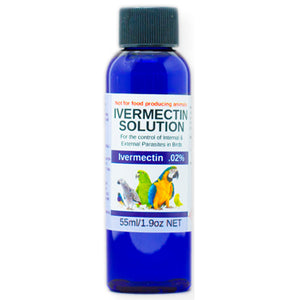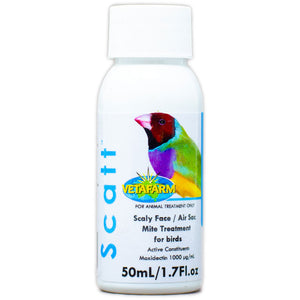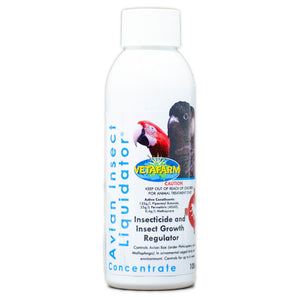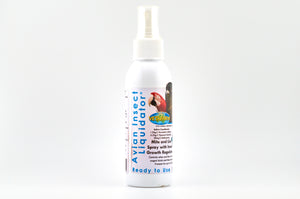Bird Flu Protection
Health Articles / Bird Flu Protection
There are two articles on this page the first one written by Malcolm Green in September 2005 and the second by vet Alan Jones in late October 2005 and published with permision of Alan and The Parrot Society UK. Here is a quick link to Alan's article.
Avian Flu – what can you do?
By Malcolm Green of The Birdcare Company (written in September 2005)
There is little doubt that one of the most troubling issues facing bird keepers this year is avian flu H5N1. Even the government is getting excited about it as they fear it will mutate into a variety that will easily transmit from human to human and lead to an epidemic. Of course this part of the story is far from inevitable.
What does seem certain is that migratory birds will bring this new disease to North America this fall and that some poultry and exotic collections will be affected. So far the virus seems to have a very high mortality rate in the birds (and humans) it has infected in SE Asia. However these birds are probably kept in less than ideal conditions and fed inadequate diets so the risk in America may be far less devastating. You have access to modern, sophisticated products that should help enormously.
In the absence of vaccines there are really only three ways to effectively deal with viral diseases - good hygiene, good bio-security and effective support for the bird's own immune system. Fortunately these same issues make sense for other infectious germs and they even contribute to improved breeding performance. So they make sense anyway.
Bio-security
I will deal with bio-security first. This is all about keeping nasty germs away from your flock. We Europeans were all given a lesson in this on our televisions during the foot and mouth epidemic a few years ago.
-
Start by roofing outdoor aviaries to reduce the contamination risk from wild birds.
-
Make sure you and your clothes are clean before you visit your birds. Consider a disinfectant foot bath outside your bird room. Make sure your disinfectant kills viruses as well as bacteria and will remain active for a long time. Most disinfectants are only active for a few hours after diluting with water. Enviroclens is strongly recommended and used by many vets and will last for up to six months. However we would recommend changing it more frequently than that if you contaminate it a lot with soil and dirt.
-
Disinfect your hands between everything you handle with a hand scrub that has broad spectrum activity such as Enviroclens Alcohol Hand Scrub. This product air-dries quite quickly after application so is not time consuming to use.
-
Use a water sanitiser in all drinking water. Water is a major cause of spreading diseases between cages. Saniclens is designed for use with birds and has been proven by thousands of bird keepers over many years.
-
If you have infected or suspect birds isolate them from the rest of your flock. Always feed the healthy birds first and change and wash clothes immediately you leave any infected birds.
-
Do not wash feeders and drinkers from healthy and infected birds in the same washing-up water. Use a combined disinfectant/cleaner to wash all cages and utensils such as Enviroclens.
-
If you do buy new birds in then follow strict quarantine procedures.
Hygiene
It would be easy to say that the right thing to do is to keep everything in your bird room spotlessly clean and sterile. Your birds would never be exposed to germs and so they would never get ill. Of course this is Utopia and not practical. This is not necessarily the best advice either as the immune system needs to be challenged to work most efficiently.
However, if your birds are at risk strict hygiene is essential. Baby birds (especially hand reared ones) do not have well-developed immune systems so they need extra special care. Ensuring that feed and water containers are cleaned properly and that cages are routinely disinfected is simple sound advice. The really important factor to consider is whether your disinfectant kills a broad spectrum of germs. Many only kill bacteria and yet, as pointed out earlier, we have already discovered that viruses are a major threat. Don't forget the risk from yeasts and fungi too.
Enviroclens is effective against viruses, yeasts, fungi and bacteria. It is also an excellent cleaner so is great for removing bird droppings from cages and perches. It can be used as a washing-up liquid or sprayed onto cage walls and perches and left to dry. There is no need to remove birds from the cages.
The most attractive features of Enviroclens are its pleasant smell and economy. Because it stays active in water for up to six months most people dilute it in a spray bottle and apply it that way. This uses far less disinfectant than the usual cloth and bucket technique.
The immune system
This is probably the most important weapon we have against viral and other infections. Sadly it is probably the least recognised option in aviculture. The immune system is working all the time to protect you and your bird from invading organisms. To describe it as a single 'system' is something of an oversimplification. It actually works at a number of different levels.
Your birds' first line of defence is its skin and the membranes that line the surfaces of the gut and respiratory tract (a sort of internal skin). Apart from being a barrier the cells in these surfaces produce chemicals that kill many germs. Natural anti-biotics if you like.
For cell membranes to function effectively they need an adequate supply of vitamin A. Since dry seeds contain virtually no vitamin A it is not surprising that the immune system of many cage and aviary birds is not very effective!
The vast majority of germs and many toxic chemicals should be cut off by this first line of defence however some get in through cuts or simply overwhelm the system.
The second line of defence is the white blood cells. There are lots of different white blood cells and they operate in many different ways. To simplify the subject I will briefly describe three mechanisms.
In the first attack white blood cells literally surround and devour the invading germs. This is really easy to understand though the mechanism by which the invader is recognised is very complex.
The battle becomes much more difficult when the invading germs have entered your bird's cells. Viruses use the host's cells to multiply. At this point the host cells themselves have to be destroyed by white cells. This is the stage in your common cold when you, not surprisingly, have a very sore throat. It may hurt but this sore throat is evidence that your immune system is engaged in the battle.
At the third level yet other types of white cells produce antibodies. These are proteins that lock onto the germs and prevent them from invading the host's cells. These are the equivalent of 'smart bombs'.
Unless the immune system has been invaded by the same germ before, the design, development and production of antibodies takes time as each new germ needs a tailor-made solution. Once an antibody has been produced its design is stored away in yet another type of white cells. Amazingly the body may only retain three cells amongst trillions with each magic formulation in it but, when the same germ strikes again, the production of antibodies is rapid and effective. This is the principle behind vaccination. Unfortunately the development and licensing of vaccines is extremely expensive so only a few bird diseases have been covered. No cage bird vaccines are licensed in the UK and relatively few in North America. Any limited supplies of vaccines against bird flu will first of all go to health workers and vets involved in dealing with any cases. You and your birds have no chance of getting any!
One key issue about immunity is that the system needs to be challenged regularly for it to function efficiently. This is why birds kept in totally sterile environments are very vulnerable to contact with other birds from less hygienic aviaries. So hygiene is a balancing act. Too clean is bad. Too dirty is bad!
Supporting the immune system
So what can we do to enable our birds to mount an effective immune response when faced with a germ invasion?
The first thing is to get the fundamental nutrition right. Birds that are vitamin and mineral deficient simply cannot respond effectively. Their cell walls will be poorly formed and they cannot repel invaders or fight back rapidly. Producing billions of white cells in a short period of time will be impossible.
Sadly, through lack of knowledge, most cage and aviary birds around the world are not fed satisfactory diets. Research in America suggests that the number of malnourished birds is as high as 98%! Many bird vets will tell you that 90% of the cases they see have malnutrition as the basis of their illness. This does not mean that bird keepers don't care, it simply highlights the lack of good information available.
Secondly we can help by minimising stress. Stress reduces the immune response. This can be caused by poor housing, moulting, breeding, poor nutrition (again), overcrowding, changes in housing or companionship, over exposure to germs and a host of other factors.
It is commonly reported that many drugs depress the immune response. So care should always be taken when considering whether drugs or immune support are the best options. And remember there are no anti-viral drugs available for your birds!
The biggest problem with stress is that it feeds on itself. A stressed bird gets ill. Illness causes stress. It is not surprising that some birds die so quickly!
Many wild animals are capable of treating themselves when they get ill. Somehow they are able to identify plants and other materials that help them feel better. Many of these are plants that, if eaten in large quantities, would be poisonous to the animal. However in moderation they hurt the germs more than the host.
Unfortunately our captive birds are unlikely to have the freedom of choice and food selection to respond to sickness in this way. We could respond to sickness in our birds by using appropriate herbs but this requires excellent stockmanship (to detect the problem early) and a detailed knowledge of herbal medicine. However by carefully selecting safe herbs The Birdcare Company is able to give natural support to birds as part of their regular diet. These herbs can prevent some specific diseases, support the digestive system (prebiotics) and help the immune system. We incorporate some of these ingredients into our Feast range of softfoods making them quite unique in the health benefits they provide. Although Feast is proving more and more popular with parrot owners many prefer to add the herbal supplement Flourish to moist foods instead.
Feast and Flourish are part of the firm's more extensive supplement system and readers are strongly advised to ensure their birds are also getting Daily Essentials 3 and CalciBoost for fully comprehensive supplementation.
You have read quite a lot about white blood cells in this article. For them to have a powerful impact on disease they need to be produced in their billions in a very short period of time. Each cell has to be complete so all the raw materials required for cell production must be available in adequate quantities. Partly we are back to the basic nutrition story again. More importantly each new cell needs a complete compliment of genetic material. This can very quickly get into short supply especially when the bird is under infectious attack. So, when birds get infectious diseases, we recommend products with extra quantities of these key ingredients. We call this our 'white cell support system' and you will find it in Guardian Angel.
The Flu and you
Our white cell support system is available for you too. The product FightBack is designed for human use and provides excellent immune system support. Take it at the first sign of any infection (sore throat, swollen glands etc) and help your immune system fight the invaders!
AVIAN INFLUENZA
By Alan Jones B.Vet.Med, M.R.C.V.S
Ornithology, avian medicine & surgery
In the light of recent extensive publicity on Avian Influenza, the Parrot Society UK has the following comments:
The situation is changing from day to day and requires regular monitoring in the light of latest developments. Since changes are so rapid, printed reports are quickly outdated. Please use the PSUK website for the latest details.
Such monitoring should NOT rely on the alarmist articles in the tabloid press, which suggest we shall all be dying in the next few weeks of this disease. Rather rely on balanced scientific evidence given by PSUK and DEFRA (www.defra.gov.uk). Sensational news sells newspapers!
I repeat comments made earlier:
- The avian influenza virus exists in wild populations of waterfowl, and is brought into the UK every winter by migrating birds. We have never had epidemics of avian influenza occurring in parrots before.
-
The most susceptible species are waterfowl and poultry; whilst it has been reported in pigeons, parrots, raptors and other species, such events are so unusual as to be reported in scientific journals. The recent death of just one parrot out of a large group in quarantine supports this, and that bird was infected because of close contact with infected finches from Asia.
-
Virulent strains of the virus infecting waterfowl will kill these birds before they reach these shores, unless the virus spreads further west across Europe.
-
Importation of the virulent virus into this country is most likely to occur via poultry products or imported infected birds. Provided we continue to ban poultry products from known infected areas, then the former should not be a problem. Our quarantine methods for the importation of birds will prevent the release of the virus into the country, as has been proved by the above mentioned reported case of the parrot from South America. Birds smuggled in illegally pose a different problem that requires addressing. Perhaps a temporary ban on parrot imports should be called? This will give time for a longer term discussion on the benefits or otherwise of this trade, while aiding the immediate control of spread of the virus. The Parrot Society supports the idea of such a ban.
Just over 60 people have died in the last two years of the H5N1 strain of avian 'flu virus in S E Asia. Over 12,000 people die every winter in the UK alone of ordinary human influenza. This gives some kind of perspective to the worldwide problem. Look at the scaremongering about SARS a few years ago, with people travelling around airports wearing face masks – did that ever develop into the predicted worldwide mortalities?
Currently reported human cases have occurred almost exclusively in humans exposed to concentrated levels of avian influenza virus, owing to the living conditions of poultry in close proximity to humans in S E Asia.
The scare is that the H5N1 strain of avian 'flu will mutate into a form that will spread from human to human, thus making an epidemic more likely. This is a big 'if', requiring simultaneous infection of a human with both avian and human strains of the virus for such mutation to take place. Whilst health authorities have to be prepared for such an eventuality, the likelihood is still very low. Predicted numbers (guestimates?) of 50,000 people dying in the UK are pure alarmist guesswork, and in any case are not massively above the normal influenza mortality rate.
Comparisons are made with the 1918 pandemic, in which millions died worldwide. Times have changed since then: nursing and isolation facilities have improved no end; antibiotics are available to treat secondary infection; anti-viral drugs are available to treat the worst affected; vaccines can be produced quickly once a pathogenic strain is identified; early warning and detection are both much improved in the last 100 years.
Vaccines are available for poultry, BUT ONLY in doses suitable for chicks of a few days old, and they are given in drinking water to flocks of several hundreds. This vaccine is NOT effective in other species nor in adult backyard poultry.
Currently available influenza vaccines given to vulnerable human patients every winter may offer some cross-protection to avian influenza, but specific vaccines produced for the particular strain would be more appropriate. Government contingency plans suggest that sufficient will be made available in the event to vaccinate every person in the UK, but initially those in the frontline of risk – avian rescue centres, wildfowl collections, poultry workers, avian veterinarians – will be offered protection.
Indoor pet parrots should be quite safe. You DO NOT need to have your much-loved pet budgerigar or parrot put to sleep in case it gives you avian influenza!! Outdoor aviary birds are theoretically at more risk, especially if sited close to ponds and lakes with waterfowl, or poultry farms. Such aviaries should be covered with Perspex sheeting to prevent contamination with wild bird droppings. Food and water bowls should be regularly cleaned and disinfected; food stores should be sealed from possible contamination by rodents or wild birds. Food, water, and sleeping areas should be sited where wild birds cannot gain access. Visitors to the aviary should be monitored, and banned if coming from a suspect area. In other words – the normal bio-security methods that we should all be taking on a regular basis anyway, to control diseases such as Newcastle Disease, Salmonellosis, Psittacosis, PBFD, PDD, etc…!
Be vigilant! Look out for sick or dying wild birds in the area. Check your birds for signs of bad breathing or sore eyes, or loss of vitality. Even if present, these do not necessarily mean avian 'flu, many other infections will produce such signs, but they should be investigated.
Certainly for the moment further gatherings of birds at local clubs or other shows is not a good idea. Apart from the slight potential risk of spreading infection, it will fuel the anti-bird publicity that is rife and benefiting from the current situation. Witness the publicity in the newspapers this weekend, and especially in the Daily Mail of Saturday 22 November. This prominent article has obviously been prompted by the anti-birdkeeping lobby, and they have jumped on the bandwagon of the current avian 'flu hysteria to attack the P S show at Stafford. Representatives from DEFRA and the RSPCA were present, as well as several avian vets, and all were satisfied with the standards at the show. However, the fact remains that such publicity will go against the Society and others in the field, and if more shows take place in the near future (Newark, Kings Lynn) in the face of the present situation, there is no doubt that further publicity will do aviculture no good at all. The fact that the Daily Mail article simply regurgitates old arguments and examples from protectionists' past campaigns, and that the photograph is of a cockatoo with PBFD are irrelevant – the damage is done. It is still a very large picture of a very sick bird, and to Joe Public it will stick in their minds and looks awful!
At the moment, the risk of Avian Influenza being introduced into the UK remains low. The risk of humans being infected is even lower. However, we need to remain vigilant and take sensible precautions as outlined above. Contingency plans have been put in place by Government, Human Health and Veterinary authorities, and DEFRA, and regular updates of the situation are posted on the DEFRA website. Such information should be noted in preference to the scaremongering of the popular media, and there is no cause for panic at this stage as far as parrot, parrakeet, and other cage and aviary bird keeping is concerned.
Alan K Jones 24/10/05 .




